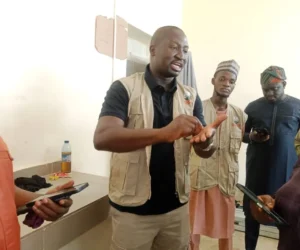Babajide Sanwo-Olu, Governor of Lagos State, has emphasised the need for innovation and partnerships in building a sustainable food system in the state, urging stakeholders to collaborate and leverage technology for a food-secure future in the country’s commercial centre.
Sanwo-Olu made this known at the Lagos Agrinnovation Summit 2.0 hosted by the Lagos State Ministry of Agriculture and Food Systems, themed ‘Thriving Food Systems: Smart Future.’
The governor, represented by Sam Egube, deputy-chief of staff, stated that Lagos remains at the forefront of food production to ensure sustainability for its growing population, in alignment with President Bola Tinubu’s Renewed Hope Agenda.
He noted that the country’s agriculture will thrive through innovation, saying that Lagos is in partnership with the private sector, and young innovators have what it takes to produce enough food for Nigeria.
“Innovation is at the heart of the President’s strategy, it’s at the heart of the state’s strategy, and we are here to execute and to cause them to focus on this great dream to leap Nigeria forward,” he said.
“We believe in investing and partnering with the private sector in food systems and logistics,” he added.
“Lagos thrives by all of us partnering together; we have come to pull that partnership together in this place through the competition that we see, through the support that we see, and that we give the innovations so that we can grow the outcome,” he added.
Abisola Olusanya, commissioner for Agriculture and Food Systems, stated that various programmes, including the Agrinnovation Club, which plays a vital role in the Produce for Lagos programme, are instrumental in implementing the ministry’s agricultural and food systems roadmap launched in 2021.
Olusanya emphasised that the summit aims to promote innovation through strategic partnerships, mentorship, resource accessibility, and supportive policies, as the state government builds the foundation for remarkable progress.
“Because feeding a city of over 24 million people is not the work of one person or one institution,” she said.
“It is the work of a system, a living, breathing network where collaboration replaces competition, where innovation meets opportunity, and where small beginnings grow into lasting impact,” Olusanya noted.
Meanwhile, Folasade Bada-Ambrose, the commissioner for Commerce, Cooperatives, Trade, and Investment, reaffirmed the state government’s commitment to creating a smart and sustainable future for youths through the agricultural sector in Africa, while commending the ministry for fostering an environment where innovation and food systems can flourish.
Read also: Nigeria: Fertile land, empty plates — Fixing food systems now
Earlier, Akinyemi Ajigbotafe, commissioner for Wealth Creation and Employment, noted that the state government has been providing funding to support and encourage creativity.
He added that youths are strongly encouraged to contribute to economic growth while unlocking potential and opportunities within the state’s agricultural and food systems.
In his keynote address, Abubakar Suleiman, CEO of Sterling Bank, said that Lagos’ tech entrepreneurs, rather than traditional farmers, hold the key to solving the state’s agricultural challenges.
He noted that despite the small landmass of Lagos, it has the greatest value chain for sustainable agriculture.
“The greatest value chain in the food systems happens during consumption. Lagos serves over 50 million people, and that is the real value,” he said.
“The greatest value happens when people touch the food. Agriculture does not end on the farm; it ends on the plate,” Suleiman explained.
He urged the government to continue supporting agribusinesses and innovations through funding, data provision, solution development, and efficient distribution systems that can help reduce prices and strengthen the overall food system.
Meanwhile, a total of N150,000 was disbursed to 36 agripreneurs to enhance productivity, promote sustainability, and improve overall efficiency within the agricultural sector.









